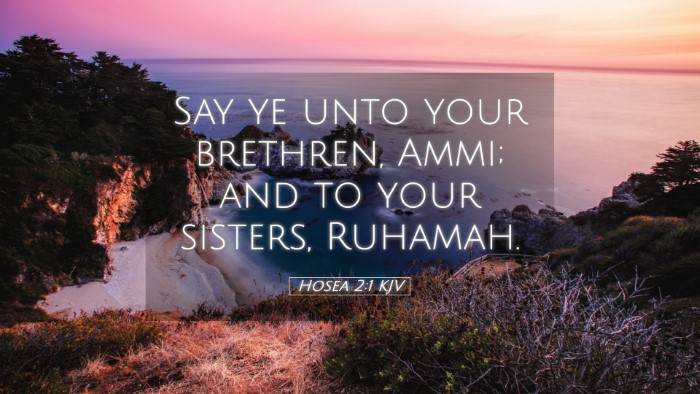Old Testament
Genesis Exodus Leviticus Numbers Deuteronomy Joshua Judges Ruth 1 Samuel 2 Samuel 1 Kings 2 Kings 1 Chronicles 2 Chronicles Ezra Nehemiah Esther Job Psalms Proverbs Ecclesiastes Song of Solomon Isaiah Jeremiah Lamentations Ezekiel Daniel Hosea Joel Amos Obadiah Jonah Micah Nahum Habakkuk Zephaniah Haggai Zechariah MalachiHosea 2:1
Hosea 2:1 KJV
Say ye unto your brethren, Ammi; and to your sisters, Ruhamah.
Hosea 2:1 Bible Commentary
Commentary on Hosea 2:1
Verse Context: Hosea 2:1 states, "Say ye unto your brethren, Ammi; and to your sisters, Ruhamah." In the broader context of the book, Hosea speaks to the plight of Israel, using marriage as a metaphor for God's relationship with His people.
Introductory Remarks
The prophecy of Hosea is rich with metaphor and theology, illustrating the deep complexities of God's covenant relationship with Israel. This particular verse introduces a moment of hope amidst a backdrop of judgment and promise of restoration. The call for acknowledgment of identity signifies a shift in the relationship dynamics between God and His people.
Exegesis of the Verse
Hosea, as a prophet, serves as a divine messenger with a profound mandate to deliver complicated truths about sin, judgment, and grace. In this verse, God instructs Hosea to proclaim a message to his people regarding their identity.
Ammi and Ruhamah: The Meaning of Names
- Ammi - translates to "my people," which emphasizes the intimate relationship God desires with His followers. This name signifies belonging and identity within God's covenant community.
- Ruhamah - means "the one loved" or "mercy," indicating the compassion and forgiveness that will envelop the people of Israel despite their waywardness.
This dual naming invokes a restoration theme, highlighting that even amidst their abandonment of God, He still sees them as His people and extends mercy.
The Call to Recognition
The command to address “your brethren” and “your sisters” reflects a communal aspect of identity. The people are addressed in familial terms, fostering unity and collective responsibility for their waywardness. Matthew Henry notes that this familial terminology encourages the Hebrew people to see themselves not just as individual sinners but as part of a larger family called to repentance and renewal.
Theological Implications
This verse serves as a poignant reminder of God’s unwavering love. The reference to “Ammi” and “Ruhamah” indicates a covenant relationship that is not easily severed. Albert Barnes expounds on the nature of God’s love as being relentless and pursuing, even when His people stray. The identifier “Ammi” signifies possession; God claims His people and desires their acknowledgment of Him.
Restoration and Repentance
The prophetic voice within Hosea offers a powerful affirmation: repentance can lead to restoration. Adam Clarke interprets this message as one of hope—encouraging the people to turn back to God, highlighting the importance of recognizing one’s status as a loved child of God. Acts of turning and seeking God are central themes in this book, and Hosea is passionate about calling God’s people back into right relationship.
Application for the Modern Reader
For contemporary pastors, theologians, and students, the implications of this verse are profound. It poses essential questions about identity, belonging, and the nature of divine love.
Covenantal Identity
The call to recognize oneself as “Ammi” and “Ruhamah” invites reflection on how individuals today identify within their spiritual community. Just as Israel is reminded of their covenant identity and relationship, modern believers are called to embrace their identity in Christ and understand the weight of their connection to God.
The Pursuit of Repentance
In echoing this call to repentance, today’s spiritual leaders must communicate the significance of returning to God. Both individually and collectively, congregations ought to engage in practices that foster a loving relationship with God, emphasizing the merciful aspect represented by “Ruhamah.” Repentance is not just about acknowledgment of sin but about a renewed relationship characterized by divine love and mercy.
Conclusion
Hosea 2:1 encapsulates significant theological principles regarding identity, community, repentance, and divine mercy. As the prophet calls the people back to acknowledgment of their relationship with God through familial terms, this verse serves not just as an ancient oracle but as a living message relevant for today’s church. Understanding our identity as beloved children of God underpins our communion with Him and informs our witness to the world.


